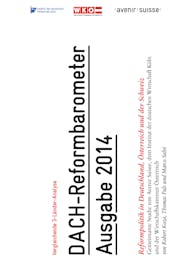Enthusiasm for economic policy reform declined in Switzerland in 2013. That is one of the conclusions in the latest «D A CH-Reformbarometer» (Germany, Austria and Switzerland Reform Barometer) compiled by Avenir Suisse, the Institut der Deutschen Wirtschaft in Cologne and the Wirtschaftskammer Österreich.The study compares reforms in three countries in five different economic policy areas, based on government policy plans likely to become law. Taking an initial index level of 100 in September 2002, subsequent developments are tracked dynamically to show how the pace of reforms since. Switzerland by the end of last year stood at 116.3 – 0.1 points down on the previous December and the first time since 2005 its reform rating dropped on an annual basis. By contrast, reform «zeal» improved slightly in both Germany (up 0.6 points to 112.0) and Austria (plus 0.5 points to 114.8), allowing both countries to close the gap marginally on Switzerland.
The latest survey shows the pace of reform in Switzerland slowed since December 2011, the start of the latest legislative period. That shift coincided with the political aftermath of the financial crisis. Even if Switzerland escaped largely unscathed – thanks in no small part to its healthy federal finances – the crisis left deep scars in everyday political life. So issues like the widening gap between middle and higher incomes, limits to globalisation and mistrust of market based solutions grew in prominence. «Reform fatigue» became evident in every policy field covered by the reform barometer, albeit to differing degrees.
The biggest contribution to the Switzerland’s decline was in the competition, infrastructure and innovation policy category, where last year’s score fell by 2.3 points to 114.4. The principal cause was the study’s detrimental assessment of the Swiss government’s 2050 energy strategy. The latter was judged as being too focused on self reliance and incorporating mistakes already made in Germany. The so called «Swissness» bill, proposing a change to trademark protection rules, was also seen somewhat negatively because of its protectionist overtones. A decline also came in the tax and financial policy category, where the sub-index dropped 0.8 points to 130.7. Among factors responsible here was parliament’s rejection of the KAPG 14 savings programme and the decision to suspend abolition of stamp duty. Two big tax policy challenges – ecological and company tax reform – are still pending and were therefore not included in the study. In social policy, the score remained unchanged at 99.9 points, with both positive and negative forces balancing each other out. There was praise for the decision to improve risk adjustment in compulsory health cover. By contrast, a dilution of invalidity insurance reform had a negative impact on the index, particularly the decision against an intervention mechanism protecting the scheme’s long term financial stability. Such a measure would have broken new ground in social insurance by introducing a so called «debt brake» (an inbuilt provision ensuring financial solvency, ed). The labour market and education category saw an 0.8 point improvement to 116.5, It should be noted here, however, that the most significant political event this year – the referendum vote against «Mass Immigration», fell outside the survey’s assessment period. As a result, relatively positive steps, such as Swiss participation in the European Union’s basic scientific research programme, will this year inevitably be outweighed.
Finally, the financial markets policy category saw a 1.6 point improvement to 119.9. Contributing here was the decision to participate in Washington’s FATCA programme and revision of the rules on administrative assistance in tracking down tax dodgers. Even if such accords prompt little enthusiasm at home, they ensure Swiss financial institutions’ access to international capital markets.





